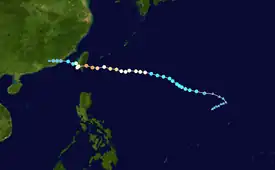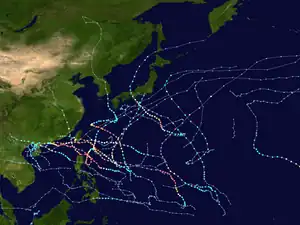 Typhoon Haikui at peak intensity, prior to landfall Taiwan on September 3 | |
| Meteorological history | |
|---|---|
| Formed | August 27, 2023 |
| Dissipated | September 6, 2023 |
| Very strong typhoon | |
| 10-minute sustained (JMA) | |
| Highest winds | 155 km/h (100 mph) |
| Highest gusts | 220 km/h (140 mph) |
| Lowest pressure | 945 hPa (mbar); 27.91 inHg |
| Category 3-equivalent typhoon | |
| 1-minute sustained (SSHWS/JTWC) | |
| Highest winds | 195 km/h (120 mph) |
| Lowest pressure | 947 hPa (mbar); 27.96 inHg |
| Overall effects | |
| Fatalities | 16 |
| Damage | $714 million (2023 USD) |
| Areas affected |
|
| IBTrACS | |
Part of the 2023 Pacific typhoon season | |
Typhoon Haikui, known in the Philippines as Typhoon Hanna, was the first major storm to hit Taiwan since Megi in 2016 and the first typhoon to do so since Nesat in 2017. The eleventh tropical storm and eighth typhoon of the 2023 Pacific typhoon season, Haikui began its life as a broad low-pressure area near the Northern Mariana Islands on August 27. The system intensified to a tropical storm the next day and was named Haikui by the Japan Meteorological Agency (JMA), with the Joint Typhoon Warning Center (JTWC) following suit shortly thereafter; PAGASA then named the same system as Hanna when it entered the Philippine area of responsibility. In the succeeding days, Haikui reached severe tropical storm strength and eventually became a typhoon, before making landfall near Taitung City, Taiwan on September 3.
Meteorological history

Tropical storm (39–73 mph, 63–118 km/h)
Category 1 (74–95 mph, 119–153 km/h)
Category 2 (96–110 mph, 154–177 km/h)
Category 3 (111–129 mph, 178–208 km/h)
Category 4 (130–156 mph, 209–251 km/h)
Category 5 (≥157 mph, ≥252 km/h)
Unknown
While Typhoon Saola was exhibiting a counterclockwise loop east of the Philippines, a new low-pressure area developed into a tropical depression on August 27 near the Northern Mariana Islands. The depression, which was slowly drifting westward, was subsequently upgraded by the JMA into a tropical storm on August 28, naming it Haikui. The JTWC began initiating advisories thereafter and was designated as 10W. Haikui then rapidly strengthened into the severe tropical storm category a few minutes later. Haikui then moved west-northwest and eventually entered the Philippine area of responsibility at around 21:00 PHT (13:00 UTC) and was promptly assigned the domestic name Hanna.
Haikui then maintained its severe tropical storm status for about a day while moving generally westwards across the Philippine Sea, before finally reaching typhoon status on September 1. Haikui then continued westwards over the Philippine Sea with little change in intensity, but later intensified into a Category 2-equivalent typhoon a day later. Haikui later rapidly strengthened into a strong Category 3 typhoon before making landfall over Taitung County, Taiwan, becoming the first storm to hit mainland Taiwan for the first time in 4 years after Severe Tropical Storm Bailu (Ineng), and the first Category 3+ typhoon to hit the island since Typhoon Megi (Helen) in 2016.[1] The collision between Typhoon Haikui & the mountain ranges of Taiwan considerably wrecked the structure of the storm and made it weaken back into a minimal Category 1 typhoon by the time it exited the landmass of the island in the evening. Haikui then moved erratically over the next few hours, heading eastwards and making a second landfall in Kaohsiung, Taiwan.[2] On September 5, Typhoon Haikui made its third and final landfall along the coast of Dongshan County, Fujian as a weakening tropical storm.[3]
Preparations and impact
Philippines
Though not making any direct landfall in the Philippines, Typhoon Haikui (locally known as Hanna) enhanced the southwest monsoon along with Typhoon Saola and Tropical Storm Kirogi, causing heavy rainfall and strong winds in many areas especially in Luzon, and causing one death.[4] Classes were suspended in some regions including Metro Manila on September 1 in the wake of the three storms that bring heavy rains and gusty winds throughout the country.[5]
Taiwan
As Haikui made landfall in Taiwan, it unleashed torrential rains and very strong gusty winds. It left 110,000 of households without power.[6]
Mainland China
On September 5, Typhoon Haikui made landfall along the coast of Dongshan County, Fujian.[7] A heavy rainstorm occurred in the coastal areas of Fujian,[8] causing the death of two firefighters.[9]
Hong Kong
| Precipitation | Storm | Location | Ref. | ||
|---|---|---|---|---|---|
| Rank | mm | in | |||
| 1 | 632.0 | 24.90 | Haikui 2023 | Hong Kong Observatory | [10] |
| 2 | 616.5 | 24.27 | Sam 1999 | Hong Kong Observatory | [10] |
| 3 | 597.0 | 23.50 | July 1926 Typhoon | Royal Observatory, Hong Kong | [10] |
| 4 | 562.0 | 22.13 | June 1916 Typhoon | Royal Observatory, Hong Kong | [10] |
| 5 | 530.7 | 20.89 | Agnes 1965 | Royal Observatory, Hong Kong | [10] |
| 6 | 519.0 | 20.43 | Agnes 1978 | Royal Observatory, Hong Kong | [10] |
| 7 | 516.1 | 20.32 | Ellen 1976 | Royal Observatory, Hong Kong | [10] |
| 8 | 497.5 | 19.59 | Dot 1993 | Royal Observatory, Hong Kong | [10] |
| 9 | 491.7 | 19.36 | Dot 1982 | Royal Observatory, Hong Kong | [10] |
| 10 | 480.9 | 18.93 | Helen 1995 | Royal Observatory, Hong Kong | [10] |
A low-pressure system associated with Haikui caused flooding in Hong Kong from September 7 to September 8. On September 7, Sha Tau Kok in the North District had already recorded more than 70 millimetres (2.8 in) rainfall by 7 pm, which the Hong Kong Observatory issued a flood warning for Northern New Territories at 7:50 pm.[11] Heavy rainfall then spread to the entirety of the city, and the weather bureau issued the Amber rainstorm signal, which was then upgraded to the Red signal in less than half an hour. At 11:05 pm, the highest warning level, Black rainstorm signal, was issued due to continued worsening situations. It was the first time the warning was issued in two years.[12] It caused three fatalities.
The torrential rainfall continued overnight and into the morning of 8 September, gradually subsiding by afternoon. The Black Rainstorm signal lasted over 16 hours, the longest duration ever since the rainstorm warning system was implemented in 1992. The HKO headquarters accumulated over 632 millimetres (24.9 in) of rainfall within 24 hours, a 24-hour rainfall rate trailing only the record set in May 1889. This also makes Typhoon Haikui the wettest storm in Hong Kong's history, breaking the record of Severe Tropical Storm Sam in 1999. Meanwhile, parts of Hong Kong Island, including Stanley, Chai Wan, Shau Kei Wan and North Point accumulated over 800 millimetres (31 in) of rainfall within just 12 hours, the area around Tai Tam even accumulated over 900 millimetres (35 in).[13]
See also
- Weather of 2023
- Tropical cyclones in 2023
- Typhoon Bilis (2000)
- Typhoon Talim (2005)
- Typhoon Longwang (2005)
- Typhoon Soulik (2013)
- Typhoon Soudelor (2015)
- Typhoon Dujuan (2015)
- Typhoon Megi (2016) – the most recent system to make landfall in Taiwan at major (Category 3-equivalent) typhoon strength.
- Typhoon Nesat (2017) – the most recent system to make landfall in Taiwan at typhoon strength.
- Typhoon Koinu (2023)
References
- ↑ Presse, AFP-Agence France. "Typhoon Haikui Makes Landfall In Taiwan: Central Weather Bureau". www.barrons.com. Retrieved 2023-09-03.
- ↑ Argosino, Faith (2023-09-04). "Hanna makes another landfall in Taiwan's Kaohsiung City; Signal No. 1 stays over Batanes". INQUIRER.net. Retrieved 2023-09-04.
- ↑ Zhang Huaying (2023-09-05). "台风"海葵"登陆福建东山". Xinhua net (in Chinese (China)). Retrieved 2023-09-05.
- ↑ "One reported dead due to 'Goring,' 'Hanna' effects". CNN Philippines. September 1, 2023. Retrieved 2023-09-02.
- ↑ "#WalangPasok: Class suspensions, Friday, September 1, 2023". Rappler. September 1, 2023. Retrieved 2023-08-31.
- ↑ "Typhoon Haikui makes landfall in Taiwan". CNA. September 3, 2023. Retrieved September 3, 2023.
- ↑ Zhang Huaying (2023-09-05). "台风"海葵"登陆福建东山". Xinhua net (in Chinese (China)). Retrieved 2023-09-07.
- ↑ ""海葵"台风给多地带来强降水 今天福建仍有暴雨到大暴雨". Fujian Provincial Meteorological Bureau (in Chinese (China)). 2023-09-05. Retrieved 2023-09-07.
- ↑ "福州消防车颱风出勤遇山洪冲走 寻获8人已2死、另1人失踪 - 两岸". China Times (in Chinese). 2023-09-05. Retrieved 2023-09-07.
- 1 2 3 4 5 6 7 8 9 10 Tropical Cyclones in 2010 (PDF) (Report). Hong Kong Observatory. p. 98. Retrieved 2012-05-14.
- ↑ "黑雨警告現正生效 同時發出山泥傾瀉警告". on.cc東網 (in Chinese (Hong Kong)). 7 September 2023. Retrieved 9 September 2023.
- ↑ Mok, Danny; Kong, Harvey; Tsand, Denise (7 September 2023). "132 Hongkongers sent to hospitals, all rainstorm alerts cancelled after deluge". South China Morning Post. Retrieved 9 September 2023.
- ↑ "Hong Kong Weather Station Observations Database". ilens.hk. Retrieved 2023-09-10.
External links
- General Information of Typhoon Haikui (2311) from Digital Typhoon
- JMA Best Track Data (Graphics) of Typhoon Haikui (2311)
- JMA Best Track Data (PDF) of Typhoon Haikui (2311) (in Japanese)
